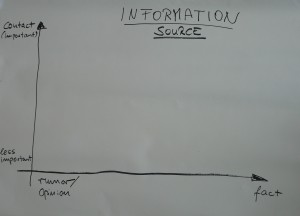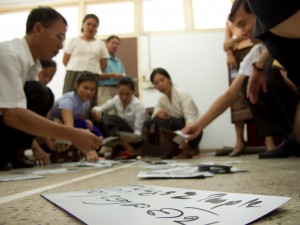Search Results for Tag: training
Using an “axis of importance” diagram to evaluate sources
 Out of one workshop at NUOL came a good tool that fits perfectly into that quest. It’s a diagram that helps journalists evaluate their sources (see photo at left, click to enlarge).
Out of one workshop at NUOL came a good tool that fits perfectly into that quest. It’s a diagram that helps journalists evaluate their sources (see photo at left, click to enlarge).![]() read more
read more
10 radio journalism and audio training resources
When it comes to professional radio journalism and audio production training, it's hard to beat having the opportunity to attend workshops conducted by experts. But if you have access to the net, learning new skills or brushing up on the basics via online tutorials and web resources could be the next best thing.

Whether you're a working journalist, trainer or j-student, here is a selection of resources useful for radio journalism and producing audio materials.
![]() read more
read more
Educators embark into a new era of journalism in Laos
 Is there a proper definition of journalism in the Lao language? Since DW-AKADEMIE’s first workshop on journalism at the National University of Laos in Vientiane, there is. It was conceived by 15 staff teachers of the Department of Mass Communication at the Faculty of Letters – after long discussions revolving around somewhat abstract terms like “media”, “the public”, “society” and “information”.
Is there a proper definition of journalism in the Lao language? Since DW-AKADEMIE’s first workshop on journalism at the National University of Laos in Vientiane, there is. It was conceived by 15 staff teachers of the Department of Mass Communication at the Faculty of Letters – after long discussions revolving around somewhat abstract terms like “media”, “the public”, “society” and “information”.
Lao is not a language that lends itself to describing abstract ideas. Yet the 15 teachers feel it was worth the effort to lay a foundation they now can build upon. They are learning the mindset, tools and skills that in combination make a journalist. The reasoning behind this is that they are the ones training a new generation of Lao students who are eager to take on the profession.
![]() read more
read more
…and action! Cinema sans convention
Once again the Berlin International Film Festival, also known as the Berlinale, has become the focus of filmmakers and movie buffs from around the world. Every year, DW-AKADEMIE conducts a five-week workshop centered around the red-carpet event. Called “Film Festival and Event Management”, the workshop spotlights young film festival managers from Asia and Africa.
Two of this year's 12 participants are Luzviminda Casagan from Pasay City, the Philippines, and Arthur Mataruse from Cape Town, South Africa. Casagan works for the Cinemalaya Independent Film Festival, Mataruse for Encounters and the Out in Africa film festivals. We spoke to both of them to find out more about film festivals and filmmaking in their home countries.
How would you describe the importance of films in cinema and television in your home country?
 Arthur Mataruse (pictured left): For us, films mainly have the function to strengthen the culture and the common identity in South Africa. Our aim is also to show other cultures and lifestyles.
Arthur Mataruse (pictured left): For us, films mainly have the function to strengthen the culture and the common identity in South Africa. Our aim is also to show other cultures and lifestyles.
Luzviminda Casagan: In the Philippines, fewer and fewer people are going to the cinema. One reason is that it is now easier to get films on DVD or from the Internet. Consequently, it's becoming more difficult for filmmakers to distribute and sell their films. Our aim with the Cinemalaya Independent Film Festival is to support young Philippine filmmakers whose films provide new insights and pursue new concepts, especially when that promotes art and culture.
![]() read more
read more
More than films – running a film festival
Once again the Berlinale is bringing together film-makers, critics and fans from all over the world. Every year to coincide with this important film festival, the DW-AKADEMIE conducts an intensive five week workshop: Film Festival and Film Management for young festival promoters from Africa and Asia.
Arthur Mataruse from Capetown, South Africa, and Luzviminda Casagan from Pesay City in the Philippines are among the participants. Mataruse works for Encounters and the Out in Africa Film Festivals and Casagan works for the Cinemalaya Independent Film Festival.
We spoke to both of them to find out more about film festivals and film-making in their home countries.
How would you describe the importance of films in your home country?
 Arthur Mataruse: For us, films mainly play the role of strengthening culture and common identity in South Africa. Our aim is also to show other cultures and lifestyles.
Arthur Mataruse: For us, films mainly play the role of strengthening culture and common identity in South Africa. Our aim is also to show other cultures and lifestyles.
Luzviminda Casagan: In the Philippines, fewer people are going to the cinema. One reason is because films are easier to find on DVD or on the internet. That means it's more difficult for film-makers to distribute and sell their films. Our aim with the Cinemalaya Independent Film Festival is to support young Filipino film-makers whose films provide new insights and pursue new concepts, especially to promote art and culture.
![]() read more
read more








Feedback